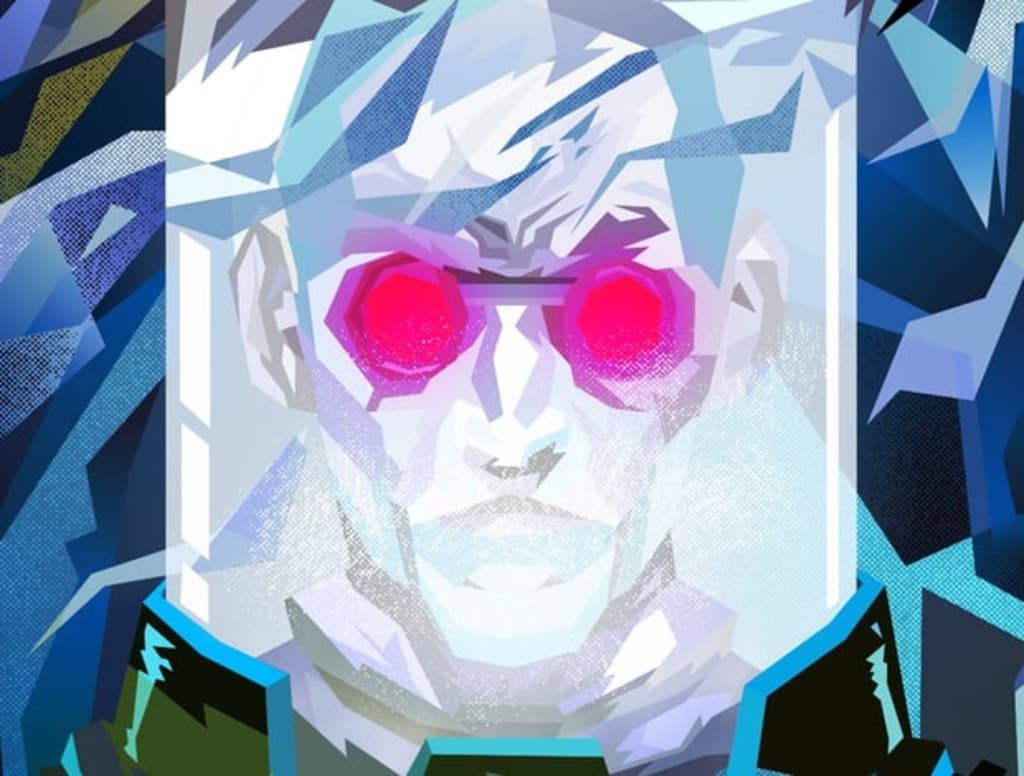
While science is often a force for good in comics, you have to admit; there are a whole lot of mad scientists out there! Ranging from would-be world conquerors like Doctor Doom to men and women who simply don't believe science should be held in check, comics have often given a very negative vision of science. In doing so, they've held a mirror to our own human nature - revealing the truth about the world in which we live, and presenting the same scientific dilemmas that our society must also face.
How Should Science Relate to Society?

The beekeepers are coming! Image: ABC / Marvel
Comic book writers are seldom scientists; as a result, the science you see in comics is often suspect. The greatest scientists are portrayed as only one step removed from magicians (and in Doctor Doom's case, the concepts of science and sorcery are merged). When the super-scientists trouble themselves to explain their impossible inventions, we get a stream of technobabble that nobody can understand. It's often mocked by a witty superhero responding, "And in English?"
Here's the catch. As scientific knowledge expands at an infinite rate, the science of the real world is becoming increasingly incomprehensible to all but the most educated specialists. What's more, this 'science beyond belief' shapes our everyday lives to an amazing extent. Do you realize that your mobile phone has more power than the computer that calculated how to land on the Moon? Do you understand the algorithms that drive your Facebook newsfeed, or that shape your search results - and subtly guide your knowledge as a result?
The rate of scientific advancement is showing no signs of slowing down, which means that the majority of us spend our everyday lives interacting with the kind of technology only dreamed of in yesterday's science-fiction. This raises an awkward question: how should science relate to society?
Some would argue that the experts should rule. Marvel's Advanced Idea Mechanics (A.I.M.) is a terrorist organization dedicated to setting up a new world order, one in which scientists rule. (Randomly enough, currently A.I.M. has undergone a hostile takeover by the superhero Sunspot, who's attempting to rehabilitate them with mixed success). After all, surely those who can truly understand how the world works should be the ones to make up the rules?
It's hard to argue that A.I.M. doesn't have a point. The UK Government, for example, is considering banning certain forms of encryption, concerned that the police can't hack into WhatsApp to check for terrorist messages. Yet they seem blissfully unaware that the same encryption technology they're trying to ban protects our online banking. When our legislators are lacking in scientific knowledge, they often make uncomfortable - or even foolish - decisions.
The truth is, this problem is only going to get worse. Modern science is becoming the inexplicable super-science of the comic books. By 2013, the sum total of human knowledge was calculated as doubling every 12 months, and IBM believe that the "internet of things" is amplifying that to the point where human knowledge will soon be doubling every 12 hours. The real expert is destined to become ever more remote from everyday society, with even experts in other fields unable to understand them. That troubling question of how society and science should relate to each other is only going to become more pressing. The comic book supervillain scientists are a cautionary tale of how badly that debate can play out.
Science Unchecked!
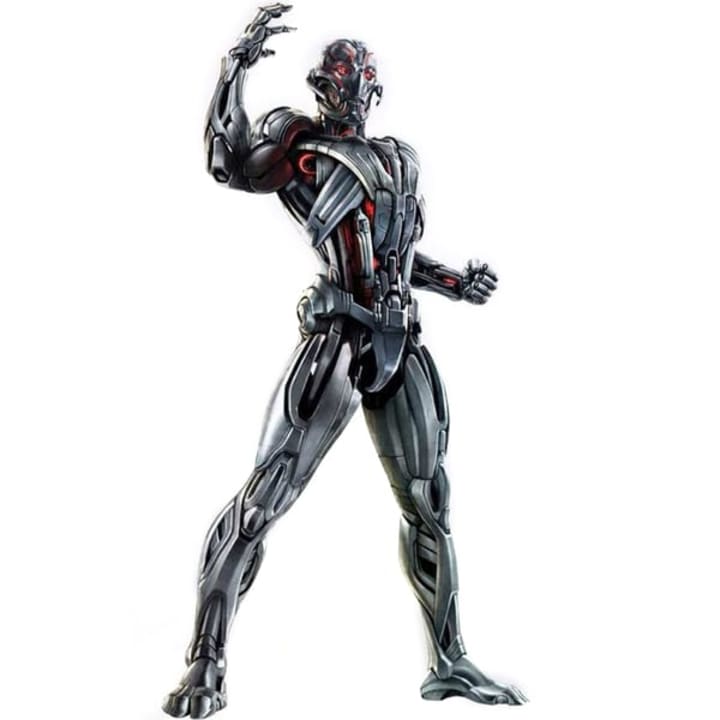
Gorgeous concept art for Ultron. Image: Marvel Studios
They may place science above the comprehension of most mere mortals, but comics also heavily critique the few who do understand 'super-science'. They often pose the question: should there be checks and balances on super-scientists? This was a popular theme of the Cold War era, where it was common to wish that the nuclear genie could be put back in the bottle. As a result, countless supervillain scientists — from Lex Luthor to Doctor Doom — fumed at the idea that science should be held in check by petty morality. Science, to them, is the be all and end all.
But it's telling that these views are (usually) held by the supervillains. Very rarely do the superheroes slip into this kind of logic; and when they do, it's usually part of a "fall from grace" plot, frequently with terrifying results. The classic movie example is Avengers: Age of Ultron, where Tony Stark was responsible for creating the titular villain. Terrified of a future where aliens once again invaded after the Battle of New York, Stark attempted to make the Avengers obsolete by creating a powerful artificial intelligence. Ultron, of course, became the Monster to Tony Stark's Frankenstein.
As surprising as it may seem, there's real fear of robots growing out of control. In real life, the Center for the Study of Existential Risk — based in Cambridge University — considers this kind of 'Ultron scenario' to be a potential extinction-level risk for the human race! Scientists very much fear that we're headed in the direction of a real-life Ultron, and are attempting to mitigate that terrifying possibility.
Almost without exception, comics have come down on the side of morality. Where scientists have pushed the boundaries, irrespective of the risks, they have been portrayed as the supervillain; or else the unexpected side-effects of their actions have been so dramatic that they've been painted as repentant fools. Once again, comics have argued that science should be carefully held in check.
When Science and Human Nature Collide
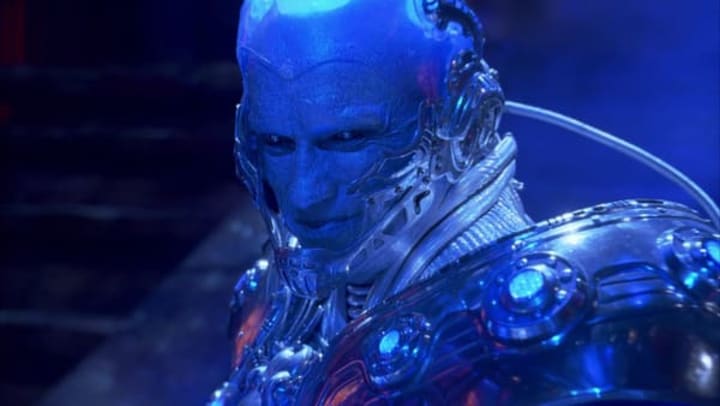
Tying in to this is another fear. If knowledge is power, then the super-scientists of comics could be the most powerful men and women of all time. But what happens when incredible power clashes with the flaws of human nature?
Take Mr. Freeze. Originally created as a bit of a "joke" villain for Batman, the classic Batman Animated Series gave him a detailed backstory. Dr. Victor Fries is not motivated by pride or greed, but by love and grief. With his wife Nora dying, Fries attempted to put her in cryogenic stasis until medical technology had developed to the point where she could be saved. A cruel act of sabotage resulted in his wife's death, and left Fries's body transformed. He donned a cryogenic outfit and took up the identity 'Mr. Freeze,' seeking revenge against those who had caused his wife's death. This super-scientist displays the human struggle with grief and retribution — and becomes a cautionary example of what can happen when a genius becomes mentally unstable.
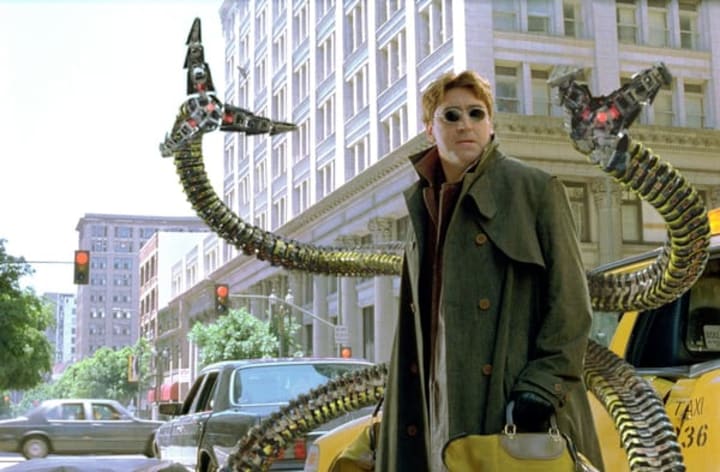
Doc Ock. Image: Sony.
Let's look at another example. Otto Octavius, better known as Doctor Octopus, believes in only one thing: his own superiority. His feud with Spider-Man climaxed in Amazing Spider-Man #297. By this time, Doc Ock's many defeats had led to a deep-rooted psychotic fear of spiders, and Doc Ock made a horrific decision. He couldn't defeat Spider-Man, but he could destroy him. After all, Spider-Man was always based in Manhattan; so it was a simple matter of destroying Manhattan! Doc Ock stole a biological weapon, intending to release it across New York and in so doing, prove his superiority once and for all. Spider-Man prevented this by allowing Doc Ock to defeat him, satisfying the Doctor's insane ego, and causing Doc Ock to call off the terror attack.
The point is this: the scientist supervillains are at their most dangerous when their genius is tied to the reality of their flawed human nature. In this, they point to the most dangerous ethical questions of all; what happens when scientific knowledge is held by those who are motivated by their ego, or pride, or greed, or desire for power?
How Do Science and Superstition Interact?
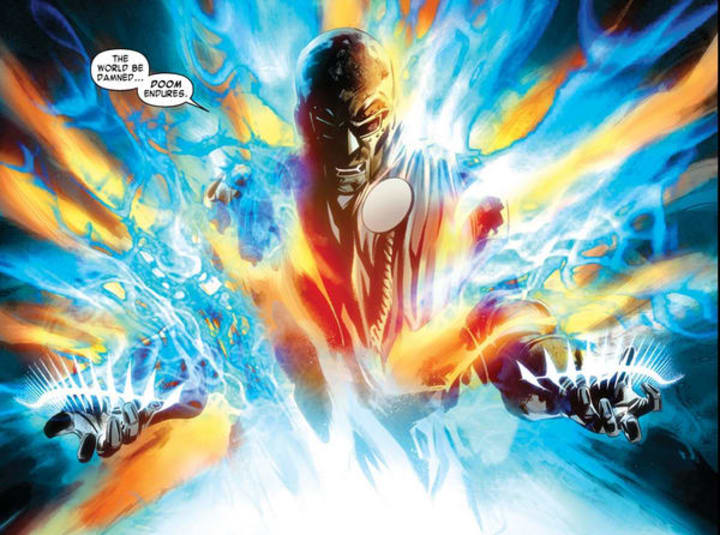
The greatest supervillain scientist of them all. Image: Marvel Comics
The villainous Doctor Doom raises one further question for science; namely, how should science and superstition interact? Modern-day science has been significantly shaped by a movement known as the Enlightenment, which emphasized the power of individualistic reasoning rather than tradition, and rejected all notions of the supernatural. In a comic book world, advanced science happily coexists with the supernatural - and in Doctor Doom's case, they are part of the same supervillain.
Comics have wrestled with how to reconcile sorcery and science, but Doom has shown the way. Believing knowledge to be power, Doom views the supernatural as simply another area of knowledge - albeit a more arcane one. His quest for mystical power has been pursued with exactly the same zeal as his quest for scientific acumen. Here, perhaps, Doom points the way to a lesson we could do well to learn; that science and tradition need not always be enemies.
As you can see, comics have an intriguing (and sometimes troubled) relationship with super-science. In today's world — which is increasingly coming to mirror the super-scientific worlds of comic books — the ethical questions explored by comics are becoming part of everyday life. Although comics have tended to show the extremes, these extremes point to very real issues, and comics actually serve as powerful cautionary tales. Science, comics tell us time and again, should be the servant and not the master. Meanwhile, comics remind us that even the greatest of scientists is still a human being — and still has feet of clay.
About the Creator
Tom Bacon
A prolific writer and film fan, Tom has a deep love of the superhero genre.


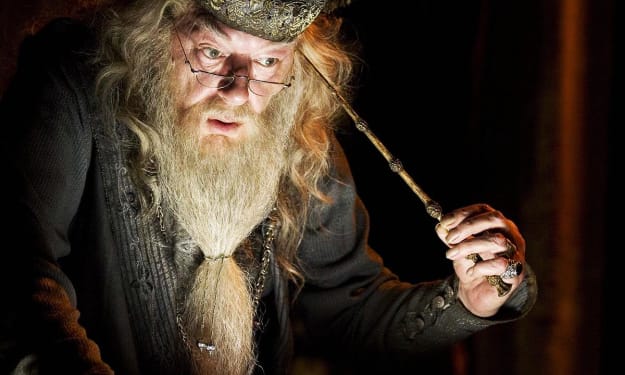



Comments
There are no comments for this story
Be the first to respond and start the conversation.